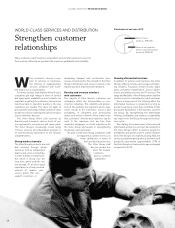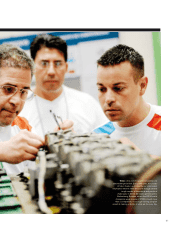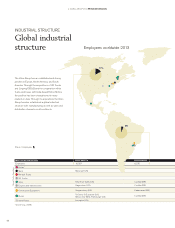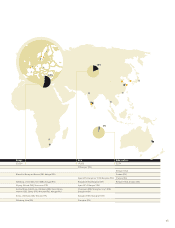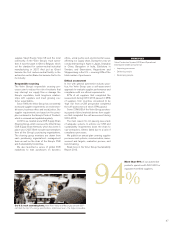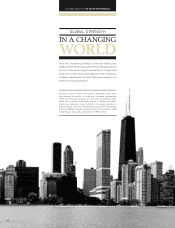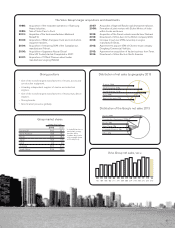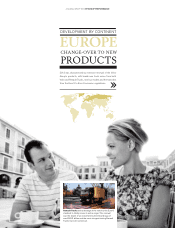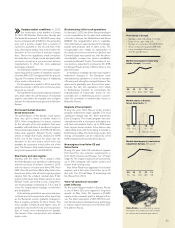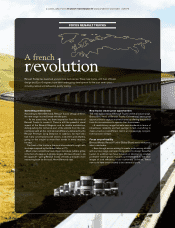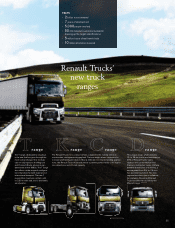Volvo 2013 Annual Report Download - page 51
Download and view the complete annual report
Please find page 51 of the 2013 Volvo annual report below. You can navigate through the pages in the report by either clicking on the pages listed below, or by using the keyword search tool below to find specific information within the annual report.
supplier, Växjö Energi, Volvo CE and the local
community. In the Volvo Group’s truck opera-
tions it was the plant in Ghent, Belgium, which
set the standard for carbon-neutral industrial
manufacturing in 2007. And just as Ghent
became the fi rst carbon-neutral facility in the
automotive sector, Braås too became the fi rst in
its industry.
Responsible sourcing
The Volvo Group’s responsible sourcing pro-
cesses aim to reduce the risk of incidents that
may interrupt our supply fl ow or damage the
Group’s reputation, build long-term relation-
ships with suppliers and meet growing cus-
tomer expectations.
Since 1996, the Volvo Group has consistently
increased supplier requirements on environmen-
tal issues, business ethics and social justice. Our
supplier requirements are based on the princi-
ples contained in the Group’s Code of Conduct,
which is reviewed and updated regularly.
In 2013, we created a new CSR Supply Chain
Steering Group, which oversees the Volvo Group
CSR Supply Chain Network, which has been in
place since 2007. Both include representatives
from all the Group’s purchasing or ganizations.
The steering group members are drawn from
each purchasing organization’s management
team as well as the chair of the Group’s CSR
and Sustainability Committee.
We also launched a series of global CSR
roadshows to train purchasers on business
Volvo Production System (VPS) and Operational
Development (OD) are aimed at:
• Improving processes
• Delivering results
• Developing people.
PRINCIPLES
ethics, social justice and environmental issues
affecting our supply chain. During the year, we
conducted training in Ageo in Japan, Shanghai
in China, Bangalore in India, Eskilstuna in
Sweden, and Greensboro, Hagerstown and
Shippensburg in the U.S. – covering 60% of the
total number of purchasers.
Ethical assessment
In line with general automotive industry prac-
tice, the Volvo Group uses a self-assessment
approach to evaluate supplier performance and
compliance with our ethical requirements.
87% of all suppliers that completed the
assessment during 2010–2013 passed it. 68%
of suppliers from countries considered to be
‘high risk’ from a CSR perspective completed
the self-assessment, of which 87% passed.
Some 72% (66) of the Volvo Group purchas-
ing spend of direct material derives from suppli-
ers that completed the self-assessment during
2010–2013.
The main reason for not passing was a lack
of adequate systems to enforce our CSR and
sustainability requirements down the chain to
sub-contractors. Others failed due to a lack of
compliance processes.
We publish an annual plan covering supplier
processes and systems, communication, meas-
urement and targets, evaluation process, and
benchmarking.
Read more in the Volvo Group Sustainability
Report 2013.
Our U.S. truck assembly plants, New River Valley and Macungie, are both SEP-
certifi ed, the top U.S. energy specifi cation, at platinum level – the highest possible.
More than 94% of our automotive
products spend is with ISO 14001 or
equivalent-certifi ed suppliers.
94%
47



